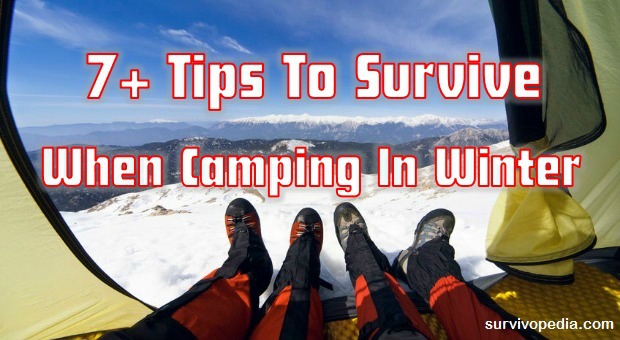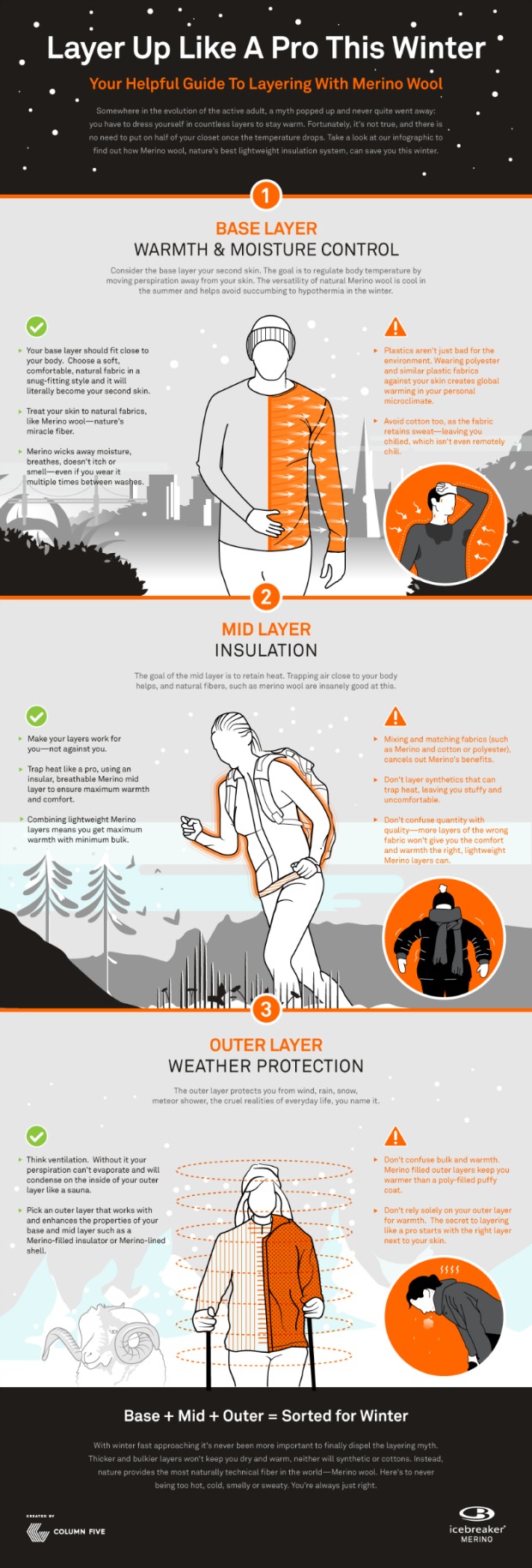
For the average Joe out there, myself included, winter camping usually means renting a cabin somewhere nice in the mountains and spending the holidays with friends, family, and a few bottles of booze while chatting, listening to CCR and enjoying the downtime. (Still I would survive out there without these, if I have to.)
However, there are hardcore outdoors aficionados who actually resent the idea of camping in a heated cabin by a romantic wood stove. That’s not camping – it’s glamping.
Moreover, there are adventurous folks who prefer to grab their backpack, rent a snowmobile, and go somewhere in the wilderness away from the mad world, the rush, and the insanity of civilization for a few days or weeks.
Regardless of what your pleasure is about camping during winter, there are a few tips and tricks you should know before going out in the cold.
Hypothermia is a very “cold” (pun intended) fact to consider if camping outside in extreme weather conditions. If you want to return home in one piece, with all your thumbs and toes in working condition, then keep reading, as I will share with you some important information about how to stay warm even in -45 F. Okay, maybe not toasty warm when it’s that cold, but you got the idea.
To begin with, you should be realistic and realize that winter camping is not for everyone. However, if you’re properly equipped and trained, you may very well have the time of your life even on Everest.
Let’s begin with the basics: pre-trip planning. Pre-planning prior to any type of endeavor is the key to success, especially if we’re talking about camping during winter.
If you remember that old Bob Dylan song, you don’t need a weatherman to tell you where the wind blows. In other words, regardless what the weather forecast says, you must always prepare for the worst winter conditions possible. Better safe than sorry, right?
1. Plan Your Trip
Even if it may sound like overkill, make sure you’ll be packing all the emergency supplies you’ll ever need in a winter survival situation, such as extra food and water supplies (or means to procure water by melting snow and ice), extra clothes, etc., especially if you’re going somewhere remote.
Also, if the weather conditions are likely to bad, as in dangerous bad, you should play it safe and postpone your trip, that is, if you don’t want to win the Darwin award, if you know what I mean. If not, Google it. It’s fun in a macabre sort of way.
Pack light, but don’t scrimp on essential gear, like a camping snow shovel, plenty of lighting, spare batteries, a first-aid kit, ski poles/walking poles and always go for a strong/sturdy waterproof tent.
20 Survival Uses For An Emergency Survival Blanket. Get yours today!
2. Take a Friend With You
Another crucial rule when it comes to winter outdoors survival is a rule I’ve learned from a Jack London novel. Never travel alone. Period.
3. Research the Campsite
Research the area you’re going to visit, check the surroundings, see if there’s a forest nearby (read firewood), see if there are any villages or small towns around, learn how long it will take to get from point A to B, etc. We’re living in the age of Google Maps and satellite imagery, so you don’t have any excuse not to get proper intel before going in!
Choose the right campsite (the sun is your best friend during the winter, so check out where it rises), start your fire first thing, before anything else, plan ahead, and stay warm folks.
4. Inform Your Family & Friends
Also, remember to inform your friends and family about your whereabouts, i.e. where you’re going to be for the next couple of days/weeks or whatever, thus making sure you’ll be able to get help if SHTF. If you can give them a detailed map of your route, that’s even better.
5. Keep Warm
Now, let’s talk about keeping warm. Obviously, the main thing to consider when camping outside during the winter is the right clothing. That’s the detail that will make all the difference in the world.
Dress in Layers
Layers is the word. Wear layers of clothing, as layers are the outdoors explorer’s best friend, besides a good fire. Layers work by trapping air between them, thus insulating your body from the cold. A few layers of clothing are more efficient than a single one, regardless of how thick it is.
Also, stay away from cotton clothes, because cotton absorbs moisture (you’ll get sweaty at some point during your trip) and damp or wet clothes are your worst enemy when it’s cold outside.
Basically, you should use three layers of clothing: the base layer, something like a second skin which helps you trap the body heat (synthetic materials/merino wool are the best for the base layer), the mid layer, which works as the main insulator (you can go for fleece lined trousers/heavy fleece) and the outer layer, which must be waterproof.

Keep Your Feet Warm
Feet are the infantry’s secret weapon, as my old drill sergeant used to say, so when you go out camping during the winter, pay extra attention to your feet.
To avoid cold feet, keep your cotton socks at home and go for polyester socks or wool socks. Specialty stores stock special foot gear (read socks and boots) designed for hiking. Obviously, the boots are very important too, as they must be waterproof and grippy, especially if you’re going to hike through the snow or ice.
Never Neglect Your Head and Your Hands
A huge amount of body heat, almost half of it in fact, is lost through the head during the winter, so make sure you wear a hat that’s going to block the wind and keep your heat in. Finally, don’t forget a nice pair of gloves.
6. Know Your Gear
The sleeping bag is an essential piece of gear when it comes to winter camping, so know your gear well if you want to survive low night-time temperatures. The idea is that you’ll require a high-quality sleeping bag if you want to be comfortable during the night and wake up healthy.
Or, double up your existing one just in case by putting one inside the other. Remember to always put a foam roll mat (or 2) under your mattress.
The idea is that shelter is pretty important when camping during the winter, as you may experience snowstorms, strong winds, and the whole palaver. Don’t get cheap on your tent, nor on your sleeping bag. They can make the difference between waking up relatively warm and safe and having somebody find your popsicle body.
7. Know Your Body
Together with knowing your gear, knowing your body is very important. Some folks sleep cold, others sleep warm. There are variables, like your age, sex, fitness level, experience, the amount of body fat and lots of other factors, which differentiate between the comfort levels achieved by different people using the exact same gear.
If you’re not familiarized with winter camping, it’s better to be over-prepared than not prepared enough. I am talking about layers of clothing, sleeping bags, and just about anything else that counts toward survival.
Go to Sleep Already Warmed Up
Always remember to go to bed, (inside your sleeping bag that is) already warmed up. The idea is that warmth cometh from within, while the sleeping bag is playing just the insulation part, so if you’re freezing and sleepy, do a few press ups/sit ups or just jump around a little before getting inside your sleeping bag. You’ll thank me later.
Eat Late
Another trick for a good night’s sleep while winter camping is to eat late, ideally a hot meal just before going to sleep. The ideal meal would be fatty (as opposed to carbohydrates), as fat gets metabolized slowly by your body (it lasts longer) and, needless to say, you’ll require fuel to make heat, right? Cheese, olive oil, bacon, pork; you know what I am talking about.
Eat high-energy food at all times, preferably in the form of warm meals. If you can’t, go for nuts, chocolate, and energy bars. Cover your exposed skin in animal fat or vaseline, just like the Inuit have been doing forever, thus preventing frostbite and windburn.
Keep Your Sleeping Bag Dry
Keep your sleeping bag dry at all costs, add more layers outside eventually as you need them. This doesn’t have to be clothes; it can be as simple as putting a metallic survival blanket over your sleeping bag.
This Emergency Survival Blanket helps retain 90% of your body heat. Get yours now!
Video first seen on Survival Frog.
Avoid breathing into your sleeping bag while sleeping (it introduces moisture) and sleep with your boots in your bag. Put them at the bottom of your sleeping bag so they don’t freeze during the night.
Leave your water filter at home and concentrate on boiling the snow. Chemical filters work painfully slow in the cold while mechanical ones may crack/fail due to the cold.
Hydrate
Don’t forget to drink enough water, even if you don’t have your usual thirst reflex, which is common in extreme cold. However, dehydration is a serious danger in sub-zero conditions, especially if you’re sweating. Also, a lot of moisture gets lost while breathing in and exhaling the cold air, as the air is very dry during the winter.
Try to prevent your water supply from freezing, but that’s easier said than done.
If you have other ideas or suggestions, feel free to comment in the dedicated section below.
This article has been written by Chris Black for Survivopedia.
0 total views, 0 views today
from Survivopedia
Don't forget to visit the store and pick up some gear at The COR Outfitters. How prepared are you for emergencies?
#SurvivalFirestarter #SurvivalBugOutBackpack #PrepperSurvivalPack #SHTFGear #SHTFBag

No comments:
Post a Comment